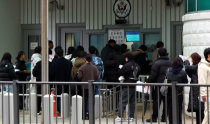[Editorial] Networks, Govt Hamper Media Development
[Editorial] Networks, Govt Hamper Media Development
Posted January. 09, 2009 07:27,
Korea is lagging behind its competitors in the latest Internet protocol TV technology that converges broadcasting and communications. Korea used to boast of its advanced IPTV technology, taking advantage of the country`s high level of Internet penetration. Other countries have started commercial IPTV service ahead of Korea while the now-defunct Korea Broadcasting Commission and the Information and Communication Ministry fought over legalizing IPTV for five years.
Korea also began commercial IPTV service at the end of last year, but imports 38 percent of critical equipment including IPTV broadcast transmission devices and 65 percent of parts such as set-top boxes. Had Korea invented the core technology first, it could have developed related domestic industries and even reaped huge benefits from exports. The foolish tug of war between state agencies forced Koreas IPTV device and parts market to give way to foreign products.
The recent failure to pass the media revision bill in the National Assembly due to opposition parties will be another self-inflicted disaster. The bill encourages competition and innovation by ending the long-standing monopoly of on-air networks and lowering the entry barriers in the industry. Korea is already late in this compared to the fast responses of other countries. Both the ruling and opposition parties have vaguely agreed to assent soon ending their confrontation, making it uncertain when to pass the bill.
Advanced economies are moving fast while Korea is strapped by internal struggle. The United States will stop analog TV service and switch to the digital format next month. This is complete digitalization where analog TV service is no longer available. Japan will go digital in July 2011. Korea will do so in January 2013. As many as 12 years will have passed since Korea began preparation for the transition in 2001. This is because of the conflict between the government and broadcasters over the budget for the transition.
A robust media industry can create tens of thousands of jobs every year and increase the demand in related industries. Still, the industry is considered a hostage for political reasons and vested interests. While the media, the National Assembly and the government are procrastinating, Koreas dream of becoming a world leader in broadcasting and communications is eroding.







